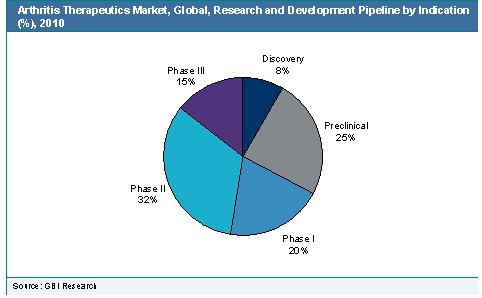Arthritis Therapeutics to 2016 - Biologics Revolutionize Treatment of Rheumatoid Arthritis and Psoriatic Arthritis
29 Oct 2010 • by Natalie Aster

“Arthritis Therapeutics to 2016 - Biologics Revolutionize Treatment of Rheumatoid Arthritis and Psoriatic Arthritis” by GBI Research essentially provides insights on arthritis therapeutics sales and price forecasts until 2016. The report examines the global arthritis therapies treatment usage patterns. In addition, the geographical distribution of arthritis therapies across the US, the top five countries in the European region and Japan are covered in the report.
The Arthritis Therapeutics study includes insights into the arthritis Research and Development (R&D) pipeline and the potential future blockbusters up to 2016. The report provides an in-depth analysis of the top three arthritis therapeutic indications, which are osteoarthritis, rheumatoid arthritis and psoriatic arthritis. Furthermore, it includes the market forecasts and treatment usage patterns of these 4 therapeutic indications.
Report Details:
Published: Oct, 2010
Pages: 125
Price: US$ 3,500.00
Report Sample Abstracts:
High Growth Rate and Increasing Use of Biologics Has Made Arthritis Therapeutics Market Attractive
The global arthritis therapeutics market is a fast growing market, with arthritis considered to be the prime factor for chronic disability in the workforce .In 2009, the global arthritis therapeutics market was worth $18.4 billion, which is forecast to grow to $30 billion by 2016, showing a growth rate of 7.3% between 2009 and 2016. The arthritis therapeutics market has been growing at a fast pace over the past few years, and is expected to accelerate in the coming years. However, the market will face a marginal decline in revenues due to the patent expiries of the biggest selling drugs, including Celebrex (celecoxib) and Humira (adalimumab), between 2009 and 2016. However, the launch of blockbuster drugs such as Vicodin and Simponi along with the presence of many potential biologics in late stage development will offset the decline in revenues. In addition, the increase in the incidence rates of osteoarthritis, rheumatoid arthritis and psoriatic arthritis will trigger growth in the global arthritis therapeutics market. As a result, the market will continue to remain fast growing, thereby attracting the activities of major pharmaceutical companies.
Strong Pipeline and the Entry of New Players Will Intensify the Competition
The arthritis therapeutics market has a strong pipeline base that will support the growth of this market thereby attracting many pharmaceutical and biotechnological companies. Major pharmaceutical companies such as Pfizer, Amgen, Merck, Roche and Novartis are active in their pipeline for arthritis. One of the major activities is the development of biologics as a part of new treatment options. There are also some disease modifiers in the pipeline related to osteoarthritis that are expected to enter the market in 2018. The entry of these disease modifiers will boost the osteoarthritis therapeutics market, thereby bringing about further rises in the arthritis therapeutics market in the coming years. The rapid entry of new players and the highly active pipeline will intensify competition.
The Top Four Companies Contribute More Than 80% to The Global Arthritis Market
The global arthritis therapeutics market is dominated by four major pharmaceutical companies that account for more than 80% of the total market. The major market share is occupied by Abbott [with Humira (adalimumab)] , the Amgen [with Enbrel (etanercept)], Johnson & Johnson [with Remicade (infliximab)] and Pfizer [with Celebrex (celecoxib). The presence of various large as well as small pharmaceutical companies makes this market strong in terms of competition. However, the presence of blockbuster drugs has made these four companies the dominant players in this market. This shows that the Arthritis therapeutics market is highly concentrated, leaving less than 20% of the market open for other players to operate.
Strategic Consolidations Have Led To the Entry of New Players Into The Arthritis Therapeutics Market
In the past seven years, many pharmaceutical companies have improved their product profiles with respect to the arthritis therapeutics market. This is due to prominent deals with the aim of introducing new products with better efficacy and safety profiles into the market. The acquisitions of Medarex by Bristol-Myers Squibb Acquires, Wyeth by Pfizer and Daiichi Sankyo by Ranbaxy laboratories have been the major acquisitions affecting the arthritis therapeutics market. Under licensing agreements, the highest valued agreement was the license given by Alder Biopharmaceuticals to Bristol-Myers Squibb for their RA molecule ALD518, currently in Phase II of development. In addition, companies such as Pfizer, Abbott, Merck and Novartis have the potential to expand their market coverage due to these consolidations, making the competition even more intense.
These strategic consolidations will help both the acquirer and licensee companies to diversify their profiles by entering into the arthritis therapeutics market, which will in turn make the arthritis therapeutics market more vibrant. These consolidations will also help the companies to generate revenue, thereby increasing the total revenue of the global arthritis therapeutics market
To order the report or ask for sample pages contact [email protected]
Contacts
MarketPublishers, Ltd.
Mrs. Alla Martin
Tel: +44 208 123 2220
Fax: +44 207 900 3970
[email protected]
www.marketpublishers.com
Analytics & News

